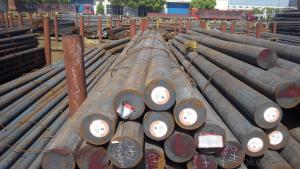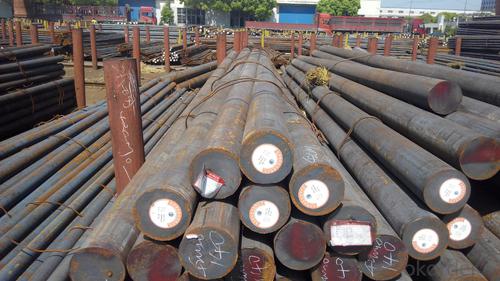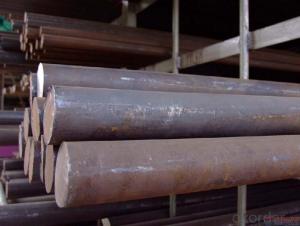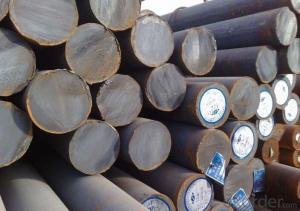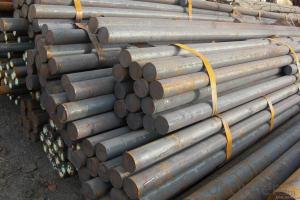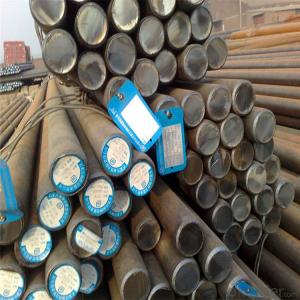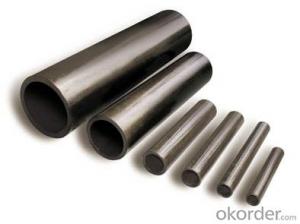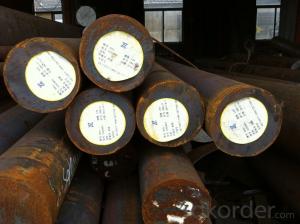Cold Rolled SAE 1045 AISI 1045 CK45 S45C Carbon Steel
- Loading Port:
- China main port
- Payment Terms:
- TT OR LC
- Min Order Qty:
- 30 m.t.
- Supply Capability:
- 10000 m.t./month
OKorder Service Pledge
OKorder Financial Service
You Might Also Like
Specification
Cold Rolled SAE 1045 AISI 1045 CK45 S45C Carbon Steel
Product Information:
Characteristic of s45c carbon steel
Thickness:3-5000mm
Width:2000-2300mm or as custom's request
Length:2-12m,as your requirment
Technique:Cold rolled or hot rolled
Surface treatment:Bare, galvanized coated or as customer's requirements.
Standard:ASTM,EN,GB,JIS,GB
Material:A283Gr.D/A573Gr.65,A516Gr65,A516Gr70,A284Gr.D
SS400,SS300,CCSB A36,A32,LRA32,LRB,Q235
Q195,Q235,Q345,SS400,ASTM A36,E235B
Terms of Payment;L/C or T/T
Chemical composition:C≤0.004%;Si≤0.030%;Mn ≤0.17%;P≤0.012%;S≤0.010%; Fe balance
Delivery Detail:within 30 days once receive deposite or confirm L/C
Packing:Standard export packing,or as requirement
Applications of s45c carbon steel
Automobile,Bridges, Buildings,
Machinery,Pressure,vessel;industries.
Ship building,Engineering construction
Mechanical manufacturing,Pavement slab,ect.
Product Overviews:
| Product Name | Typical Grades | Diameter(mm) | Standard adopted |
| Carbon Steel | 20 (1020/S20C/C22) | Ø16-Ø300 | GB/SAE/JIS/DIN |
| 40 (1040/S40C/C40) | |||
| 45 (1045/S45C/C45) | |||
| Bearing Steel | GCr9 (51100/SUJ1) | Ø12-Ø250 | |
| GCr15 (52100/SUJ2/100Gr6) | |||
| GCr9SiMn (A485-Gr.1/SUJ3) | |||
| Cr-Mo Steel | 20Cr (5120/SCr420H/20Cr4) | Ø12-Ø250 | |
| 40Cr (5140/SCr440/41Cr4) | |||
| 42CrMo(4140/SCM440/42CrMo4) | |||
| Gear Steel | 20CrNiMo | Ø16-Ø600 | |
| 20CrMn(5115/SMnC420/20MnCr5) | |||
| 20CrNiMo(8620/SNCM220/20CrMiMo2) |
Product Show:

Our Advantages:
· Industry experience over 20 years.
· Shipment of goods -More than 70 countries worldwide.
· The most convenient transport and prompt delivery.
· Competitive price with best service.
· High technical production line with top quality products.
· High reputation based on best quality products.
With our experienced, enthusiastic and dynamic staffs, we assure to bring you the products with best quality, reasonable prices and good after-sales services under the motto: Friends First, Business After.
Communication, Experience, Expertise and Best efforts are our Promises to you.
- Q: What is the significance of carbon content in special steel?
- The carbon content in special steel is significant as it directly impacts the steel's strength, hardness, and overall performance. A higher carbon content typically results in a harder and stronger steel, making it suitable for applications that require durability and wear resistance, such as cutting tools or machinery components. On the other hand, a lower carbon content enhances the steel's toughness and ductility, making it more suitable for applications that require flexibility, such as structural components or automotive parts. Therefore, controlling the carbon content in special steel is crucial in tailoring its properties to meet specific industrial requirements.
- Q: Is special steel resistant to wear and abrasion?
- Indeed, special steel is renowned for its exceptional resistance against wear and abrasion. Through the utilization of distinct alloying elements and heat treatment procedures, special steel is frequently crafted to elevate its hardness and toughness. These remarkable attributes confer upon it a remarkable immunity to the damaging consequences of wear and abrasion, rendering it ideal for endeavors necessitating longevity and durability. In various industries, including automotive, aerospace, construction, and manufacturing, special steels are frequently employed due to the harsh environments they encounter or the repetitive mechanical actions they endure, both of which can induce wear and abrasion.
- Q: What are the different grades and specifications of special steel?
- Special steel encompasses a wide array of high-quality steels that are specifically engineered to possess exceptional properties and fulfill specific requirements for various industrial applications. These special steel grades and specifications are determined based on their composition, mechanical properties, and intended use. One commonly employed grading system for special steel is the AISI-SAE system, which classifies special steel into different grades based on their chemical composition. An example of a popular grade of special steel in this system is AISI-SAE 4140, known for its remarkable strength, toughness, and wear resistance. It contains elements like chromium, molybdenum, and carbon, contributing to its exceptional properties. Another extensively used grading system is the ASTM system, which categorizes special steel based on their mechanical properties and intended use. A commonly used grade in this system is ASTM A36, renowned for its excellent weldability, toughness, and low carbon content. It finds application in structural uses such as building construction and bridges. Specific grades and specifications of special steel are also tailored for particular industries or applications. For instance, stainless steel is a special steel grade with a high chromium content, offering superb corrosion resistance. It is widely employed in applications requiring resistance to moisture, chemicals, and high temperatures, such as the food industry or medical equipment manufacturing. Additionally, tool steel is a special steel grade designed specifically for fabricating cutting and shaping tools. It possesses high hardness, wear resistance, and heat resistance, making it suitable for activities like machining, forging, or die casting. Apart from these grades, special steel can be further classified based on specifications such as heat treatment requirements, surface finish, or dimensional tolerances. These specifications ensure that the special steel meets the specific requirements of the intended application. Overall, the diverse grades and specifications of special steel are customized to meet the varied needs of different industries and applications, providing superior performance, durability, and reliability.
- Q: What are the main applications of special steel in the food packaging industry?
- Special steel is widely used in the food packaging industry due to its unique properties and benefits. It is primarily used for manufacturing various components of food packaging machinery, such as cutting blades, molds, and dies. The main applications of special steel in this industry include ensuring precision cutting, shaping, and forming of packaging materials, enhancing durability and resistance to wear and tear, and maintaining hygiene standards by preventing contamination and facilitating easy cleaning.
- Q: What are the specific requirements for special steel used in the electronics industry?
- In order to meet the unique demands of the electronics industry, special steel must fulfill certain requirements. These requirements include: 1. To protect electronic components from environmental factors like moisture, humidity, and chemical exposure, special steel used in the electronics industry must have high corrosion resistance. 2. Efficient transmission of electricity within electronic devices relies on the excellent electrical conductivity exhibited by the steel. This property is crucial for the proper functioning of electronic components. 3. Depending on the application, special steel used in the electronics industry must possess specific magnetic properties. Some electronics require non-magnetic steel to avoid interfering with sensitive magnetic components, while others may need specific magnetic properties for magnetic shielding or as core material in transformers. 4. To ensure the longevity and reliability of electronic components, the steel must possess high strength and durability, enabling it to withstand the stresses and strains encountered during the manufacturing process and throughout the lifespan of the electronic device. 5. Special steel used in the electronics industry must be able to withstand high temperatures without compromising its structural integrity or electrical properties. This is particularly important in electronic devices that generate heat, such as computer processors or industrial control systems. 6. The steel must be easily formable and machinable to enable efficient manufacturing processes and the production of intricate electronic components. This allows for the fabrication of complex shapes and designs required in the electronics industry. 7. To ensure optimal performance and reliability of electronic devices, special steel used in the electronics industry should have minimal impurities and contaminants. High purity steel guarantees the absence of unwanted elements that may cause electrical or chemical interference. Meeting these specific requirements for special steel used in the electronics industry is crucial for producing high-quality and reliable electronic devices. By fulfilling these requirements, the steel can withstand the challenges and environmental conditions unique to the electronics industry, ultimately contributing to the overall performance and functionality of electronic devices.
- Q: Can special steel be used in the beverage manufacturing industry?
- Yes, special steel can be used in the beverage manufacturing industry. Special steel, such as stainless steel, is often preferred due to its corrosion resistance, hygienic properties, and durability. It is commonly used in various components of beverage production equipment, including tanks, pipes, valves, and fittings, to ensure the integrity and quality of the final product.
- Q: What are the applications of special steel in the oil and gas supply chain?
- Special steel has various applications in the oil and gas supply chain. It is commonly used in the construction of pipelines, drilling equipment, and offshore platforms. Special steel's high strength, corrosion resistance, and ability to withstand extreme temperatures make it ideal for these applications. Additionally, special steel is used in the manufacturing of valves, fittings, and other components that are crucial for the efficient and safe operation of the oil and gas supply chain.
- Q: How long does special steel typically last in various applications?
- The lifespan of special steel in various applications can vary depending on several factors. Special steel is known for its exceptional strength, durability, and resistance to corrosion, making it suitable for a wide range of applications. However, the actual lifespan of special steel will depend on the specific application, maintenance practices, and environmental conditions it is exposed to. In general, special steel can last for several decades or even longer when used in industries such as construction, automotive, aerospace, and manufacturing. For instance, in building structures, special steel can last for 50 to 100 years, thanks to its robustness and ability to withstand extreme loads and weather conditions. In automotive applications, special steel components like engine parts, suspension systems, and body frames can have a lifespan of 15 to 30 years, given that they are properly maintained and not subjected to excessive wear and tear. When it comes to the aerospace industry, special steel is commonly used in critical components like turbine blades, landing gears, and fuselage structures. These parts undergo rigorous testing and inspection procedures and are designed to last for decades, typically around 30 to 50 years, before requiring replacement or refurbishment. In manufacturing processes, special steel tools and dies can have a lifespan ranging from a few years to several decades, depending on the intensity of use, the material being processed, and the maintenance practices employed. Proper lubrication, cooling, and regular maintenance can significantly extend the lifespan of these tools. It is important to note that the lifespan of special steel can be adversely affected by factors such as exposure to harsh chemicals, high temperatures, aggressive environments, or inadequate maintenance. Therefore, regular inspections, maintenance, and adherence to recommended usage guidelines are crucial in ensuring the longevity of special steel in various applications.
- Q: How is special steel protected against corrosion?
- Special steel is protected against corrosion through a variety of methods, including the application of protective coatings such as zinc or epoxy, the use of corrosion-resistant alloys in the steel composition, and the implementation of cathodic protection systems that involve the use of sacrificial anodes or impressed current to prevent rusting.
- Q: What are the main applications of special steel in the textile industry?
- Special steel is used in the textile industry primarily for manufacturing textile machinery components. It is utilized to produce high-quality parts and tools like knitting needles, loom parts, and various cutting and shaping equipment. The strength, durability, and resistance to wear and tear of special steel make it an ideal material for these applications, ensuring the efficient and reliable operation of textile machinery in the industry.
Send your message to us
Cold Rolled SAE 1045 AISI 1045 CK45 S45C Carbon Steel
- Loading Port:
- China main port
- Payment Terms:
- TT OR LC
- Min Order Qty:
- 30 m.t.
- Supply Capability:
- 10000 m.t./month
OKorder Service Pledge
OKorder Financial Service
Similar products
Hot products
Hot Searches
Related keywords
